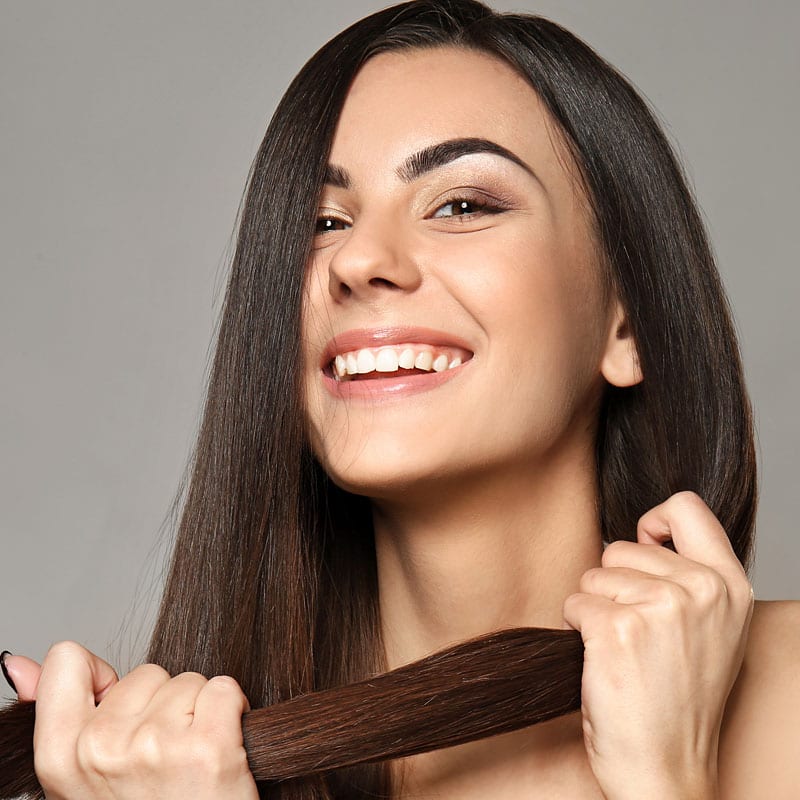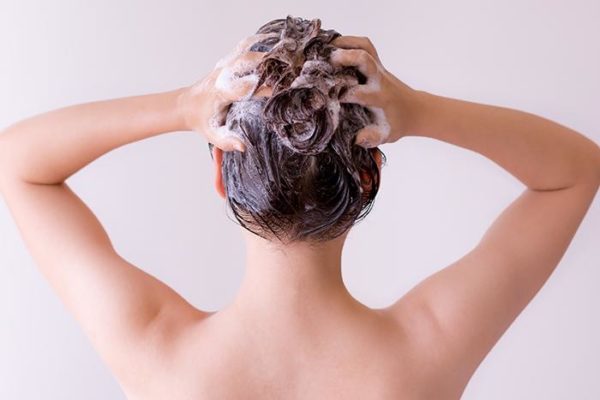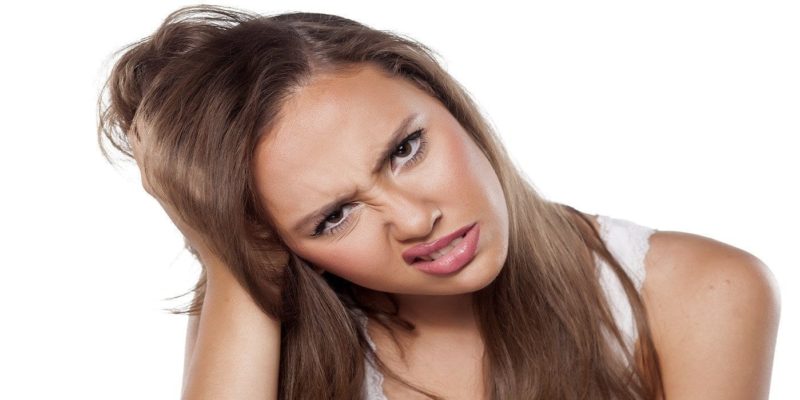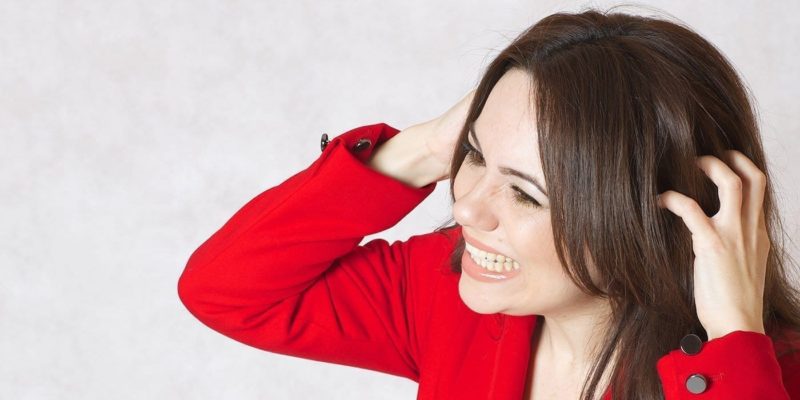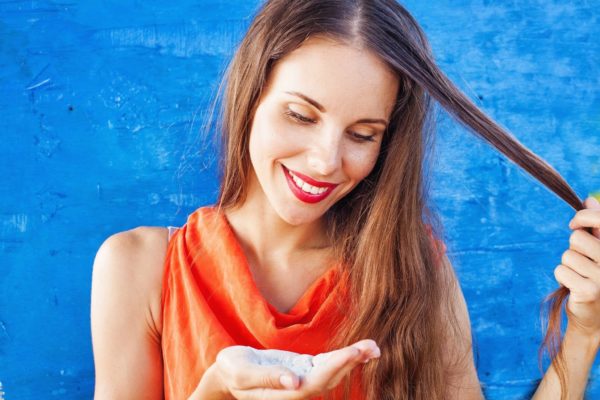How To Treat Dandruff With Hair Products and Lifestyle Tips
Hair dandruff is a fairly common condition that people of all hair types experience. If you see small, light-colored flakes among the strands of your hair, then you probably have it.
So what exactly are those little flakes? They’re dry, dead skin that’s come off your scalp.
There’s a misconception that dandruff is related to hygiene, but in reality, dandruff is no indication of a person’s cleanliness. Instead, it has many causes, which means it can be difficult to treat.
Fortunately, understanding your skin type can help you pinpoint the underlying cause. Once this is identified, you can start treating this condition and flaunt your locks without embarrassment.

Additionally, dandruff isn’t limited to your scalp. It can manifest in other places:
- Mustache
- Beard
- Eyebrows
The good news is, wherever you have it, there are ways to treat it.

Many skin conditions affect the scalp, so addressing the underlying condition is essential. However, if it’s only a matter of seasonal dryness or oiliness, you can learn how to treat dandruff with home remedies.
No matter what the underlying cause is, know that you deserve to live without discomfort or embarrassment. If you can’t pinpoint the cause on your own, a haircare professional may be able to help.
Malassezia
Malassezia is a type of yeast fungus that naturally lives on human skin. While this may sound disturbing, it’s perfectly normal.
The issue arises when there’s an overgrowth of malassezia, which can cause irritation. The overabundance of this fungus can cause your dead skin cells to shed more quickly than the normal renewal cycle. These cells then become dandruff.
How does malassezia overgrowth happen? This fungus loves to feed on fat, which our pores excrete in the form of oil. If your scalp is especially oily, the fungus has more resources to feed it, allowing it to grow faster than normal.
Eczema
Eczema is another common skin condition linked to hair dandruff. It’s an immune response to an irritant or allergen and usually manifests as redness that may appear rash-like.
There are several different types of eczema, some of which affect the scalp. One of this conditions’ main symptoms is itchiness, which can lead to scratching.
Eczema tends to have “flares” where symptoms appear or suddenly get worse after an allergen trigger. The good news is, with treatment, eczema can be managed and flares kept to a minimum.
Psoriasis
Like eczema, psoriasis is a chronic skin condition that has flares. It’s very common on the scalp and has a long list of painful symptoms:
- Soreness, burning and itching
- Skin so dry that it cracks and bleeds
- Redness and scaling
Both dryness and scratching from itchiness can cause dandruff, making it very common among individuals with psoriasis. Fortunately, this medical condition can be treated by a doctor and even go into remission, which means individuals no longer experience symptoms.
Dry Skin
Beyond medical conditions, hair dandruff can be a result of normal skincare issues such as dryness. Everyone struggles with dryness at some point, especially during winter when wind and cold exacerbate symptoms.
Dry skin can become itchy, prompting people to scratch at their scalps. It also has a tendency to flake off as newer, healthier cells form underneath.
Oily Skin
Confusingly, oily skin can also cause dandruff. This is due to malassezia, which is more difficult to manage if your skin is naturally oily.
Excessive oil can also cause skin irritation, which can lead to itching. Generally, being too far on either side of the dry-oily spectrum is an issue.
Contact Dermatitis
Contact dermatitis is the medical name for an allergic reaction that prompts skin inflammation. Many people have contact dermatitis and the triggers can vary:
- Fragrance
- Certain metals
- Pollen
If you experience contact dermatitis on your scalp, it’s likely caused by one or more of your haircare or styling products. Many available shampoos, conditioners, gels and other products contain chemicals, some of which can cause irritation to sensitive skin or trigger an allergic reaction.
Product Buildup
Even if you don’t have allergies or sensitive skin, you can still get hair dandruff from product buildup. Many people go a day or two between washes, which is actually recommended to keep your locks moisturized. However, this can lead to buildup of styling products, which can irritate the scalp and produce dead skin cells.

Seek Medical Treatment
If you’re experiencing rash-like redness, itchiness or inflammation on other parts of your body, it’s essential that you consult a medical professional. Your doctor can help you determine if you have allergies or any of the skin conditions we’ve previously discussed.
It’s important that you not try to treat a medical condition yourself, as it may inadvertently make the symptoms worse. A physician can prescribe medication and other treatments that tackle the underlying cause, thereby alleviating dandruff and other symptoms in one fell swoop.
Moisturize
Dandruff caused by dry skin is fairly simple to treat; in fact, many brands offer hair dandruff shampoo that specifically moisturizes. If your dandruff is relatively mild, you can even try a regular moisturizing shampoo.
You can also try deep hydrating conditioners and styling products that moisturize during use. You’ll want to take extra care during cold weather and avoid heated styling, as it can dry out hair and skin.
Change Your Washing Routine
Dandruff doesn’t have anything to do with how clean you are, but it can be affected by how often you wash your hair. This is true of both dry and oily skin.
For example, dry skin can be caused by over-washing. Shampoo strips away natural oils, which can leave your scalp feeling tight.
If a dry scalp is an issue, try shampooing every other day. This gives your skin a break and allows it to retain its protective natural oils.
For individuals with oily scalps, you may want to shampoo more often. If this dries out your hair too much, you can try washing every other day and using dry shampoo on the days you go without.
Finally, if you get dandruff with certain styling products, make sure that you wash your hair on the days you use them. Some products are greasy and can add to oiliness, creating a two-fold problem, so it’s essential that you shampoo to keep them from building up.

Of course, it’s important to listen to your body when trying these out. If you try a treatment and don’t see a significant difference or notice worsening of symptoms, it’s time to move on to something different.
Baking Soda
Should your dandruff problem be rooted in oily hair, baking soda is an excellent home remedy. It has amazing antifungal properties that can fight back the malassezia feeding on your oils.
Additionally, it’s a gentle exfoliant, which can clear away dead skin cells so the new, healthy ones beneath can flourish. To apply, add one-to-one ratios of baking soda and water in a spray bottle, spritz it close to your scalp and rinse it out in the shower.
Probiotics
Probiotics nourish beneficial bacteria in the human body. They’re commonly used to assist with digestion issues and prevent yeast infections, but they can also help with hair dandruff.
Additionally, they can decrease the severity of eczema symptoms, which may be due to anti-inflammatory properties. There are many different probiotic supplements you can take or you can eat probiotic-rich foods such as yogurt.
Omega-3 Fatty Acids
Another anti-inflammatory option is omega-3 fatty acids. These molecules offer a variety of benefits:
- Prevent premature aging
- Promote wound healing
- Manage hydration
- Manage oil production
These can also be consumed either in a supplement or by eating certain foods, such as fatty fish, walnuts and chia seeds.
Aspirin
When you’re trying to learn how to treat dandruff, aspirin may be one of the last things you think of. However, this over-the-counter drug has two things going for it: anti-inflammatory properties and salicylic acid.
The anti-inflammatory properties can obviously help if your dandruff is tied to sensitive skin or an allergic reaction. However, you may not know that salicylic acid can also fight dandruff by removing dead skin flakes. In fact, it’s so effective that many anti-dandruff shampoos contain this ingredient.
Apple Cider Vinegar
If baking soda doesn’t work for you, you can try apple cider vinegar instead. This cooking ingredient has anti-fungal properties that can help you manage malassezia. Just like with baking soda, you can spritz it onto your scalp and rinse it away with water.
Self-Care
Surprisingly, stress can actually exacerbate malassezia growth. Being under stress for a long period of time releases certain hormones in our bodies that can do a lot of damage over time. It turns out that one of the things it affects is oil production.
If you’ve been stressed out lately and noticed more hair dandruff as a consequence, you should take a little time for yourself. Do something that relaxes you, such as taking a walk, meditating or having an at-home spa day.
Aloe Vera
You may be familiar with aloe vera as a treatment for sunburns, but did you know it can also help with dandruff? Not only does aloe vera soothe with anti-inflammatory properties, but it’s also antifungal, making it the perfect solution for malassezia-caused dandruff.
Coconut Oil
Coconut oil is an excellent natural moisturizer and is commonly added to many skin- and haircare products. If your dandruff is the result of dry skin, using a hair dandruff shampoo that contains coconut oil can help.
Alternatively, you can use masks with coconut oil or styling products. Please note that it can be quite heavy, so you may need to use it in conjunction with volumizing products if you have fine hair.
Tea Tree Oil
Tea tree oil is all the rage in haircare and it’s no wonder — this substance is antifungal, anti-inflammatory and antimicrobial. The one drawback is that people with sensitive skin may not be able to use it, since it can cause irritation.

Formaldehyde
That’s right, it’s not just for preserving frogs — it’s also used in haircare and styling products. However, it can cause irritation and allergic reactions, so best to avoid it.
Fragrances
While they may smell nice, fragrances can be very drying and some may cause irritation or allergic reactions. Synthetic fragrances are especially problematic, as they can contain a wide range of chemicals that don’t play well with dry skin.
Sulfates
Though pretty common in the haircare industry, sulfates are bad news if you have hair dandruff. They’re very drying and can actually damage your hair as well.
Parabens
Yet another common ingredient that does more harm than good, parabens can irritate sensitive skin, leading to more dead skin cell shedding. If you have problems with shampoo irritating your scalp, make sure you look out for parabens.
Dandruff can be embarrassing, but fortunately, you don’t have to live with it. Now that you know how to treat dandruff, you can find the right regimen for you and enjoy beautiful, flake-free hair.
Our Top 4 Scalp Treatments
Choosing the right products and scalp treatments for your strands can only [Read More...]
Scalp Care – Start At The Root
Healthy and happy hair starts at the root which means the way [Read More...]
Dandruff vs Dry Scalp
When you have a flaky scalp, it can not only be embarrassing, [Read More...]
Looking for the Best Anti-Dandruff Shampoo?
Fighting off dandruff can be an unending struggle for many women. As [Read More...]
Feeling Flaky? Here’s the Best Anti-Dandruff Shampoo
Holiday cheer is all around us, and winter is drawing near. Despite [Read More...]
What Makes the Best Anti-Dandruff Shampoo Brands Special?
From supermarket options to clinical strength formulations, there's more in the fight [Read More...]

